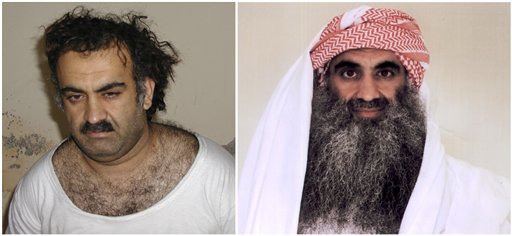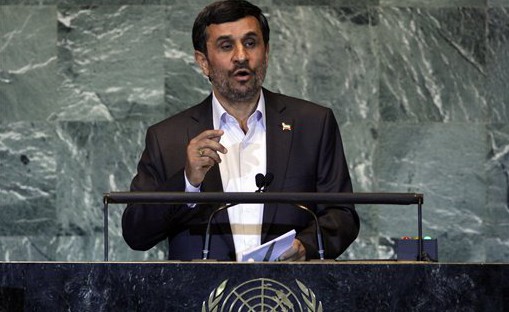

HELL ON EARTH: Julie McDermott, center, is helped by others as they make their way through the debris near the World Trade Center on Sept. 11, 2001. (AP Photo/Gulnara Samoilova)
WHO’S REALLY WINNING? Countless Dead; Trillions Spent: Does the War on Terror Play Right Into al-Qaeda’s Plan?
It’s a tough question to ask.
Nearly 3,000 people were murdered on Sept. 11, 2001 in the three combined terrorist attacks against the United States at the World Trade Center, Pentagon and United Airlines Flight 93, which crashed in a field near Shanksville, Pa., after passengers revolted against their hijackers 10 years ago this week.
Nearly 50,000 first responders to the Twin Tower attacks are still suffering the effects of searching the rubble for survivors and collecting the dead, plagued with a host of ailments from Ground Zero’s toxic dust and the horrific scene: post traumatic stress disorder, respiratory illnesses, depression and cancer, to name a few; it’s hard to quantify how many have already died as a result of their selfless work.
According to the latest figures from the U.S. Department of Defense, more than 6,200 U.S. military servicemen and women have been killed since the onset of the War on Terror, the global initiative launched by President George W. Bush in the wake of the attacks to root out and destroy terrorist networks across the planet, which will also reach its 10th anniversary Oct. 7. Nearly 50,000 U.S. servicemen and women have been wounded in the war’s many theaters, primarily in Iraq and Afghanistan.
Some estimates, such as those from the independent London-based polling agency ORB (Opinion Research Business), put Iraqi casualties since the U.S.-led invasion in 2003 through 2008 at more than 1 million, with civilian deaths numbering in the tens of thousands. The death toll in Afghanistan is also estimated in the tens of thousands, including civilians.
The tremendous loss of life in the post-9/11 world is accompanied by an equally staggering fiscal price tag for the United States to finance such operations. According to the U.S. Congressional Budget Office’s August 2011 The Budget and Economic Outlook: An Update, U.S. defense spending will reach $703 billion this year—$160 billion for the Iraq and Afghanistan wars—a figure that is more than double the defense spending since that tragic day. Though the wars in Iraq and Afghanistan have cost the American taxpayers more than $1 trillion since 2001 (the lion’s share spent on the war in Iraq), some—such as Nobel laureate of economics Joseph E. Stiglitz—put the total cost of just the Iraq conflict at $3 trillion; trillions, he argues in a 2008 Washington Post op-ed, that could have gone to funding schools for underprivileged children, revitalizing decaying infrastructure, tackling the social security elephant or helping desperately poor nations.
Afghanistan has become the United States’ longest and most expensive war, with no real end in sight.
Despite the astronomically high spending for defense, President Barack Obama and Congress have been at war with each other over what other programs and services to trim, cut back, or erase entirely in order to combat our current unprecedented $14 trillion national debt while maintaining or increasing such levels of defense funding. They’ve also been grappling with how to revive the U.S. economy and best tackle the abysmal U.S. job market, which has been plagued with an unemployment rate continuing to hover around 10 percent. At least 14 million are currently out of work.
Though the United States was already weathering an economic slowdown prior to the Sept. 11th attacks, the aforementioned mounting costs—both human and financial—eerily match Osama bin Laden and al-Qaeda’s stated strategy of hitting America and its allies’ wallets through a long, protracted military conflict that would ultimately drain them economically and result in their defeat.
“We are continuing this policy in bleeding America to the point of bankruptcy,” bin Laden said in a 2004 video reported on by news outlets across the globe, crediting the demise of the Soviet Union in Afghanistan to the same strategy. “Using guerrilla warfare and the war of attrition to fight tyrannical superpowers… We, alongside the [U.S.-backed] mujahedeen, bled Russia for 10 years until it went bankrupt and was forced to withdraw in defeat,” proclaimed the terrorist leader.
Yes, after a decade-long global manhunt, Osama bin Laden has been killed. His international network of terrorism has been disrupted. Scores of agents and suspected al-Qaeda operatives have been captured or killed—including many of the architects of the 9/11 attacks, such as its alleged mastermind Khalid Sheikh Mohammed. Major terrorist plots have been foiled as a result of increased U.S. intelligence and surveillance, including schemes to blow up the Long Island Rail Road, Brooklyn Bridge, JFK International Airport and the New York City subway system, among other targets. Other plots, such as those of would-be Shoe Bomber Richard Reid, Christmas Underwear Bomber Umar Farouk Abdulmutallab and Times Square Bomber Faisal Shahzad, simply failed by chance.
Along the way, we toppled madman Saddam Hussein’s regime and ushered in democratic elections in Iraq.
The question remains: Who’s really winning?






